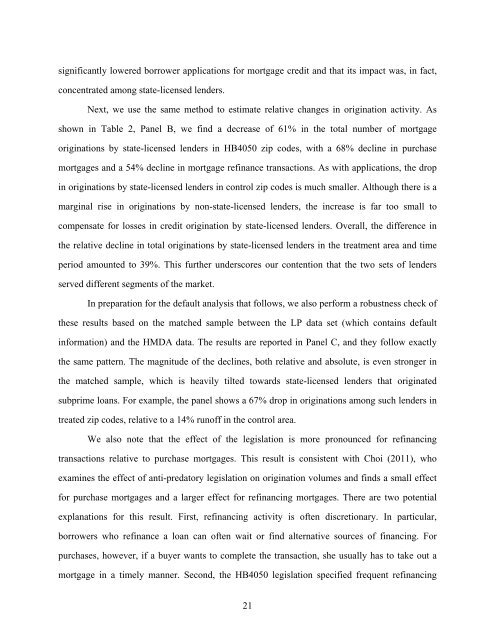You also want an ePaper? Increase the reach of your titles
YUMPU automatically turns print PDFs into web optimized ePapers that Google loves.
significantly lowered borrower applications for mortgage credit and that its impact was, in fact,<br />
concentrated among state-licensed lenders.<br />
Next, we use the same method to estimate relative changes in origination activity. As<br />
shown in Table 2, Panel B, we find a decrease of 61% in the total number of mortgage<br />
originations by state-licensed lenders in HB4050 zip codes, with a 68% decline in purchase<br />
mortgages and a 54% decline in mortgage refinance transactions. As with applications, the drop<br />
in originations by state-licensed lenders in control zip codes is much smaller. Although there is a<br />
marginal rise in originations by non-state-licensed lenders, the increase is far too small to<br />
compensate for losses in credit origination by state-licensed lenders. Overall, the difference in<br />
the relative decline in total originations by state-licensed lenders in the treatment area and time<br />
period amounted to 39%. This further underscores our contention that the two sets of lenders<br />
served different segments of the market.<br />
In preparation for the default analysis that follows, we also perform a robustness check of<br />
these results based on the matched sample between the LP data set (which contains default<br />
information) and the HMDA data. The results are reported in Panel C, and they follow exactly<br />
the same pattern. The magnitude of the declines, both relative and absolute, is even stronger in<br />
the matched sample, which is heavily tilted towards state-licensed lenders that originated<br />
subprime loans. For example, the panel shows a 67% drop in originations among such lenders in<br />
treated zip codes, relative to a 14% runoff in the control area.<br />
We also note that the effect of the legislation is more pronounced for refinancing<br />
transactions relative to purchase mortgages. This result is consistent with Choi (2011), who<br />
examines the effect of anti-predatory legislation on origination volumes and finds a small effect<br />
for purchase mortgages and a larger effect for refinancing mortgages. There are two potential<br />
explanations for this result. First, refinancing activity is often discretionary. In particular,<br />
borrowers who refinance a loan can often wait or find alternative sources of financing. For<br />
purchases, however, if a buyer wants to complete the transaction, she usually has to take out a<br />
mortgage in a timely manner. Second, the HB4050 legislation specified frequent refinancing<br />
21

















